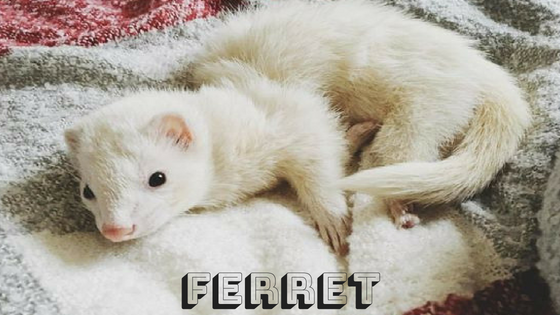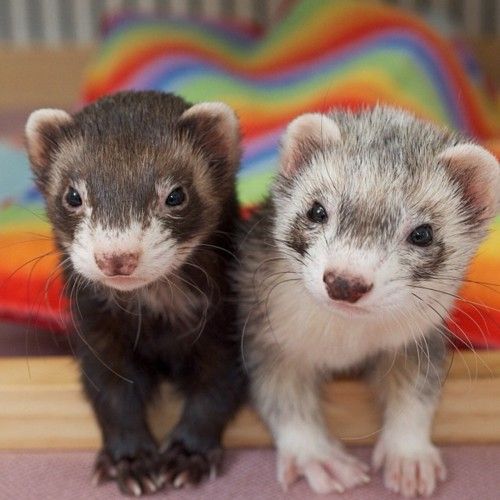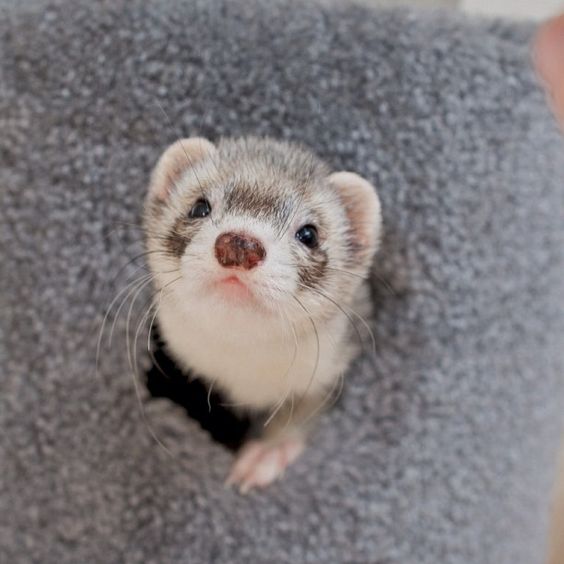A ferret is a small, furry creature with a cone-shaped nose, long tail and a long, pear-shaped body with short legs and long claws. Ferrets are related to wolverines, ermines, minks and weasels in the Mustela genus. They are popular, though often controversial, pets.
The vast majority of ferrets are the domesticated variety. Experts think they were bred more than 2,500 years ago from either European polecats (Mustela putorius) or steppe polecats (Mustela eversmanii). These polecats should not be confused with skunks, which are sometimes colloquially called polecats. There are no naturally wild domesticated ferrets. If a pet ferret escapes, it rarely survives more than a few days, according to the American Ferret Association.
However, there is a wild species called the black-footed ferret (Mustela nigripes). These creatures are rare — North America's rarest mammal, according to the University of Michigan's Animal Diversity Web — and they are considered endangered by the International Union for Conservation of Nature.
Life with Ferrets
Consider the following details as you determine whether or not to purchase a pet ferret
Their environment: ferrets have a reputation for being escape artists, and Johnson recommends single- or multi-level, open wire cage designed for ferrets with a solid floor and a secure door for your ferret’s home. Due to lack of ventilation, glass enclosures (such a fish tanks) are not recommended. The cage should be located in a quiet area where the temperature can be kept between 60 and 80 degrees Fahrenheit and should include bedding (like a towel, blanket or old shirt) that should be washed a minimum of once per week. A litter box that fits in the cage should be filled with recycled newspaper products or aspen shavings. Avoid cedar and pine shavings, which can irritate the respiratory tract, and clay or clumping cat litter, which may be ingested by ferrets, Johnson said. Clean the litter box daily.
Their diet: ferrets are carnivores and should eat premium commercial food that is high in fat and protein and specifically formulated for ferrets. They should not be fed dairy products, fruits, vegetables, or foods high in fiber, carbohydrates, or sugar. And, of course, ferrets should have fresh water every day.
Their activity: because ferrets like to chew and swallow things, their toys must be sturdy and have no small parts that can be broken or pulled off. Toys made of foam rubber, latex, or plastic that might be chewed should be avoided, Johnson said. If possible, create “ferret-proofed” area for playtime by covering openings into walls, blocking spaces behind cabinets and removing any appliances or breakable items. Ferrets love interacting with their people, so be sure to spend time at least one hour with them every day and consider having more than one ferret to help keep them entertained.
Their coats: ferrets are naturally clean animals and groom themselves often. They shed twice a year, however, and should be combed during these times to remove loose fur, in addition to regular nail trimmings and monthly teeth-brushing, according to the AFA. Regular baths with shampoo made for ferrets can help tame a ferret’s naturally musky odor but should not be given too frequently.
Toys
Ferrets love to play, so be sure to provide lots of toys in lots of variety for them. The more that they have to do, the less mischief they will be inclined to find. (If you don't provide a toy, they'll find or make one!) And, you will delight in watching them at play. Most cat toys are great for ferrets, but ferrets are harder on them than a cat would be. They chew more vigorously, and foam or rubber or small parts can get lodged in their windpipes or cause intestinal blockage. Be sure to buy toys that are durable. Specially made ferret tunnels, hammocks, and swings are also great favorites and will provide hours of amusement.
Food
Your ferret needs plenty of fresh water and a diet high in fat and protein. While many ferret owners feed cat or kitten food, that is in large part because there are simply very few ferret foods available. Kaytee makes a good ferret food specially formulated for your pet's nutritional requirements, and we offer it through our Web site or mail-order catalog. In any case, avoid fish and fish-flavored cat food, which can create a litterbox odor problem, and do not feed your ferret dog food as that will fill your ferret up without providing some of the necessary nutrients. Do not feed human snacks to your ferret, as many foods are toxic or indigestible. Avoid chocolate, caffeine, tobacco products, colas, coffee, tea, ice cream, milk, and onions. Ferrets do need variety, though, and they will do just about anything for a treat-including learning tricks such as sitting up, walking to heel, begging, and rolling over. You can reward your pet for desirable behaviors or just add variety to your ferret's diet with vegetables, fruits, and treats. Safe, specially formulated ferret treats are available through companies like Ferret Fiesta, in flavors ranging from carob raisin to peanut butter.
Health
Ferrets live for 6 to 13 years and during that time they will require regular vaccinations and veterinary check ups to remain in tip top shape. In particular, Ferrets are at risk of fleas and heartworm, so monthly preventative treatments like Advocate (for kittens) should be used. They are also at risk of canine distemper, and annual vaccination can prevent this. Annual health checks are recommended for ferrets up to 5 years of age and twice yearly health checks once they enter their senior years to keep them in ship shape. Any concerns you may have should be consulted with a veterinarian at the earliest possible time. Although ferrets are hunters, they still become prey to other animals so they hide their illness very well like other small mammals.
Grooming
Ferrets are naturally clean animals, and tend their own fur carefully. They need a bowl of water in order to wash their faces, and they clean the rest of their coat in the same fashion as a cat. Baths should be kept to a minimum, regular bathing may make your ferret smell good for a night, but its strips the natural oils off their fur and they will then overcompensate for this by producing even more! They will then get A LOT smellier and their skin will dry out.
If your ferret lets one go from the poofy valve while playing, or just rolls around in muck its best to just give them a wipe with a soap free baby wipe or even better, just a warm damp towel. You can also let them swim around in some water.
Try limit proper baths for once every quarter (or less) and use a soft easy going shampoo such as Natural Animal Solutions Shampoo or BioGroom Ferret Shampoo and Conditioner. These are very gentle shampoos and do not strip all those lovely oils from their skin. As all pets and humans, ferrets have sensitive eyes and ears, be sure to stear clear of the face when you do need to bathe them. Ferret ears do get quite waxy, cleaning on a regular basis with a gentle pet friendly ear cleaner with some cotton wool is recommended. Regular nail clipping is also required, a small pair of human nail clippers is the perfect size. If you need assistance just phone the campus and a staff member can help you out.
Here Some Beautiful Photos Of Ferret:
If You Like, Please Share...





















great post about the ferret, I'm a deep ferret lover, this is my blog https://www.blackferrets.com/, hope you can check out
ReplyDeleteThank you :)
Deletegreat post about the ferret, I'm a deep ferret lover, this is my blog https://www.blackferrets.com/, hope you can check out
ReplyDeleteUnder the heading FOOD, you have said that you can reward your ferret with FRUITS or VEGETABLES. Both of these categories are harmful to ferrets as they cannot digest the fibres in them and can cause an intestinal blockage, so you should never give them. Please correct as this could save a life.
ReplyDelete